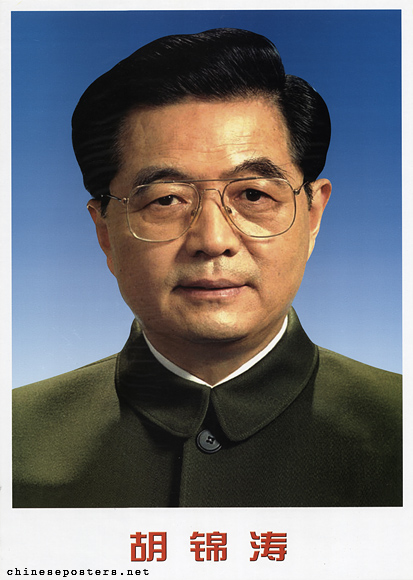More languages
More actions
mNo edit summary Tag: Visual edit |
No edit summary Tag: Visual edit |
||
| Line 1: | Line 1: | ||
{{Infobox politician|name=Hu Jintao|native_name=胡锦涛|image_size=200|birth_date=21 December 1942|birth_place=Taizhou, Jiangsu, [[Republic of China|China]]|nationality=Chinese|political_orientation=[[Marxism–Leninism]]<br>[[Mao Zedong Thought]]<br>[[Socialism with Chinese Characteristics]]|political_party=[[Communist Party of China]]|image=HuJintao.jpg}}'''Hu Jintao''' (born 21 December 1942) is a retired Chinese politician who was the [[Communist Party of China]]'s General Secretary (2002—2012) and the President of [[People's Republic of China|China]] (2003—2013) among other positions, many of which were succeeded by now-President [[Xi Jinping]]. | {{Infobox politician|name=Hu Jintao|native_name=胡锦涛|image_size=200|birth_date=21 December 1942|birth_place=Taizhou, Jiangsu, [[Republic of China|China]]|nationality=Chinese|political_orientation=[[Marxism–Leninism]]<br>[[Mao Zedong Thought]]<br>[[Socialism with Chinese Characteristics]]|political_party=[[Communist Party of China]]|image=HuJintao.jpg}}'''Hu Jintao''' (born 21 December 1942) is a retired Chinese politician who was the [[Communist Party of China]]'s General Secretary (2002—2012) and the President of [[People's Republic of China|China]] (2003—2013) among other positions, many of which were succeeded by now-President [[Xi Jinping]]. | ||
During his term in office, Hu reintroduced state control in some sectors of the economy that were relaxed by the previous administration. Hu sought to improve socio-economic equality domestically through the [[Scientific Outlook on Development]], which aimed to build a [[Harmonious Socialist Society]] that was prosperous and free of social conflict. | During his term in office, Hu reintroduced state control in some sectors of the economy that were relaxed by the previous administration. Hu also re-introduced universal healthcare to China, which had been unfortunately privatized during the 1980s and 1990s. He also sought to improve socio-economic equality domestically through the [[Scientific Outlook on Development]], which aimed to build a [[Harmonious Socialist Society]] that was prosperous and free of social conflict. | ||
In foreign policy, Hu advocated for "China's peaceful development", pursuing soft power in international relations and a corporate approach to diplomacy. | In foreign policy, Hu advocated for "China's peaceful development", pursuing soft power in international relations and a corporate approach to diplomacy. | ||
Revision as of 20:41, 9 February 2023
Hu Jintao 胡锦涛 | |
|---|---|
 | |
| Born | 21 December 1942 Taizhou, Jiangsu, China |
| Nationality | Chinese |
| Political orientation | Marxism–Leninism Mao Zedong Thought Socialism with Chinese Characteristics |
| Political party | Communist Party of China |
Hu Jintao (born 21 December 1942) is a retired Chinese politician who was the Communist Party of China's General Secretary (2002—2012) and the President of China (2003—2013) among other positions, many of which were succeeded by now-President Xi Jinping.
During his term in office, Hu reintroduced state control in some sectors of the economy that were relaxed by the previous administration. Hu also re-introduced universal healthcare to China, which had been unfortunately privatized during the 1980s and 1990s. He also sought to improve socio-economic equality domestically through the Scientific Outlook on Development, which aimed to build a Harmonious Socialist Society that was prosperous and free of social conflict.
In foreign policy, Hu advocated for "China's peaceful development", pursuing soft power in international relations and a corporate approach to diplomacy.
